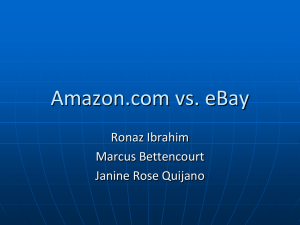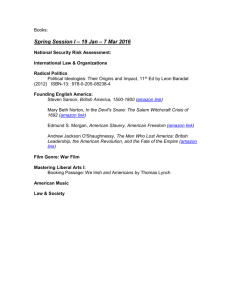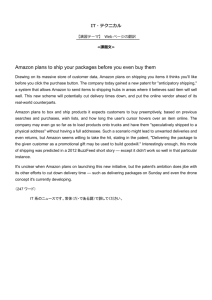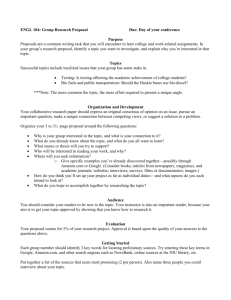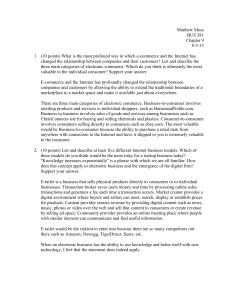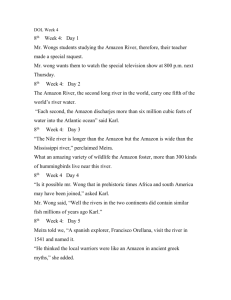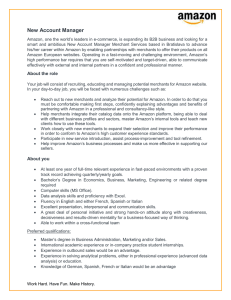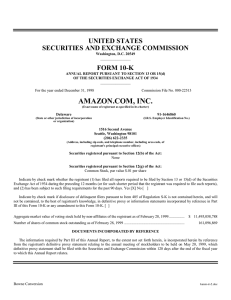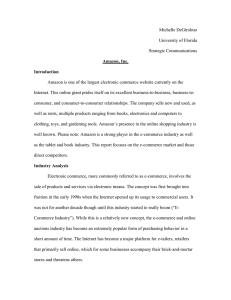Amazon.com Annual Report Project
advertisement
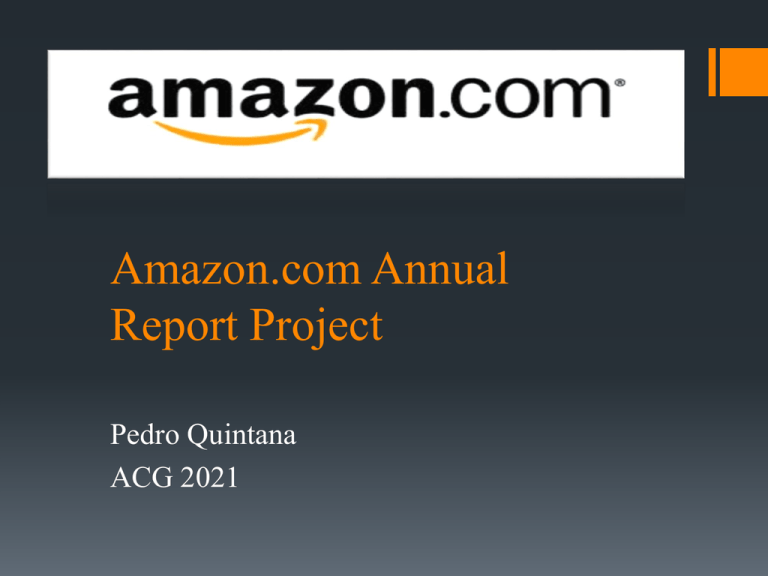
Amazon.com Annual Report Project Pedro Quintana ACG 2021 PART ONE Corporation Information Name of Corporation: Amazon.com Inc Principle product or service: Retail-Catalog & Mail-Order Houses Stock Market on which shares are tradedNasdaqGS Price of a common share on date- $307.55 Number of shares traded on date- 4,543,264 PART ONE Industry What’s the chief industry in this firm? – Retail-Catalog & Mail-Order houses. Few competitors- Apple( AAPL), Barnes & Noble Inc. (BKS), Wal-Mart.com USA, LLC(PVT1), and eBay Inc.(EBAY). Is amazon a growth or mature industry? – Amazon.com is a mature industry by the fact that it has passed both the emerging and the growth phases of industry growth. PART ONE Management Information Name of Chief Executive Officer CEOMr. Jeffrey P. Bezos Name of Chief Financial Officer CFOMr. Thomas J. Szkutak Total compensation for most recent year for CEO- $1.68 million. PART ONE Quarterly Reports Balance sheet date of quarterly ReportsSeptember 30th, 2012 Net Income- $(274) millions Total Revenue- $13,806 millions Net cash flow Increase- $2,335 in millions PART ONE Daily stock closing prices Amazon closing prices 350 300 Share price 250 200 150 close 100 50 0 date PART ONE Volume of shares traded Amazon volume of shares traded 16000000 14000000 Share volume 12000000 10000000 Series1 8000000 Series2 6000000 4000000 2000000 0 7/12/12 8/12/12 9/12/12 10/12/12 11/12/12 12/12/12 1/12/13 Date 2/12/13 3/12/13 4/12/13 5/12/13 6/12/13 Part one Executive Compensation Table Part two Auditors Information Name of Audit Firm- Ernst & Young Date of Auditor’s report- January 29th, 2013 Part two Annual Financial Statement Information Dates of financial statements(Balance sheet dates)December 31, 2012 and 2011. Number of years covered (income Statements)- Four years: 2010, 2011, 2012. Part two Analysis of Balance sheet Total Assets- For 2011: $25,278 and for 2012: $32,555 Total Liabilities- For 2011: $17,521 and for 2012: $24,363. Inventory flow assumption- LIFO Depreciation method- Straight-line method. Part two Ratio analysis?? CONFUSED Primary (basic) earning per shareearning per share = Profit- dividend. See notes on this page first, you need to find the annual report: ( it is on the instruction page of the project: I give you the following link: http://www.sec.gov/cgibin/viewer?action=view&cik=1018724&accession_number=0001193125-13028520&xbrl_type=v The formula is on the book ( or you can google the name of the ratio and Investopedia will usually provide the formular). I will give you two examples here. Primary (Basic) earnings per share = ( net income- dividend on preferred stock) / average outstanding shares You do not have to calculate this one, it gives you on the consolidated statements of operations ( after the line of net income) It was 0.09 on Dec31, 2012 Another example is current ratio= current asset/ current liability On Dec 31,2012, on consolidated balance sheets, current asset is 21296 million, current liability is 19002 million. So you can calculate current ratio using the above formula. Part two Analysis of the cash flow statement. Was there a net cash inflow or outflow? There was a net cash outflow of $(274) million Where did the firm primarily spend cash? Changes in inventory, capital expenditures, and sale purchase of stock. From where did this cash come from? From Revenue, Retained earnings, and investments. Part two Analysis of risk List some economy and industry-wide risk factors: 1. Intense competition. 2. Expansion places a significant strain on their management, personnel, and operations, 3. Expansion into new products, services, and geographic regions. 4. Fluctuation in their operating results and growth rates. Part two International Does the firm have significant foreign sales? – Yes Does the firm have significant foreign suppliers? – Yes With what countries does the firm have significant business relations with? All over the world, but in the year of 2012 Italy, China, and Spain. Is the firm vulnerable to currency fluctuations? – Yes Would you buy, sell, or hold this company? HOLD
